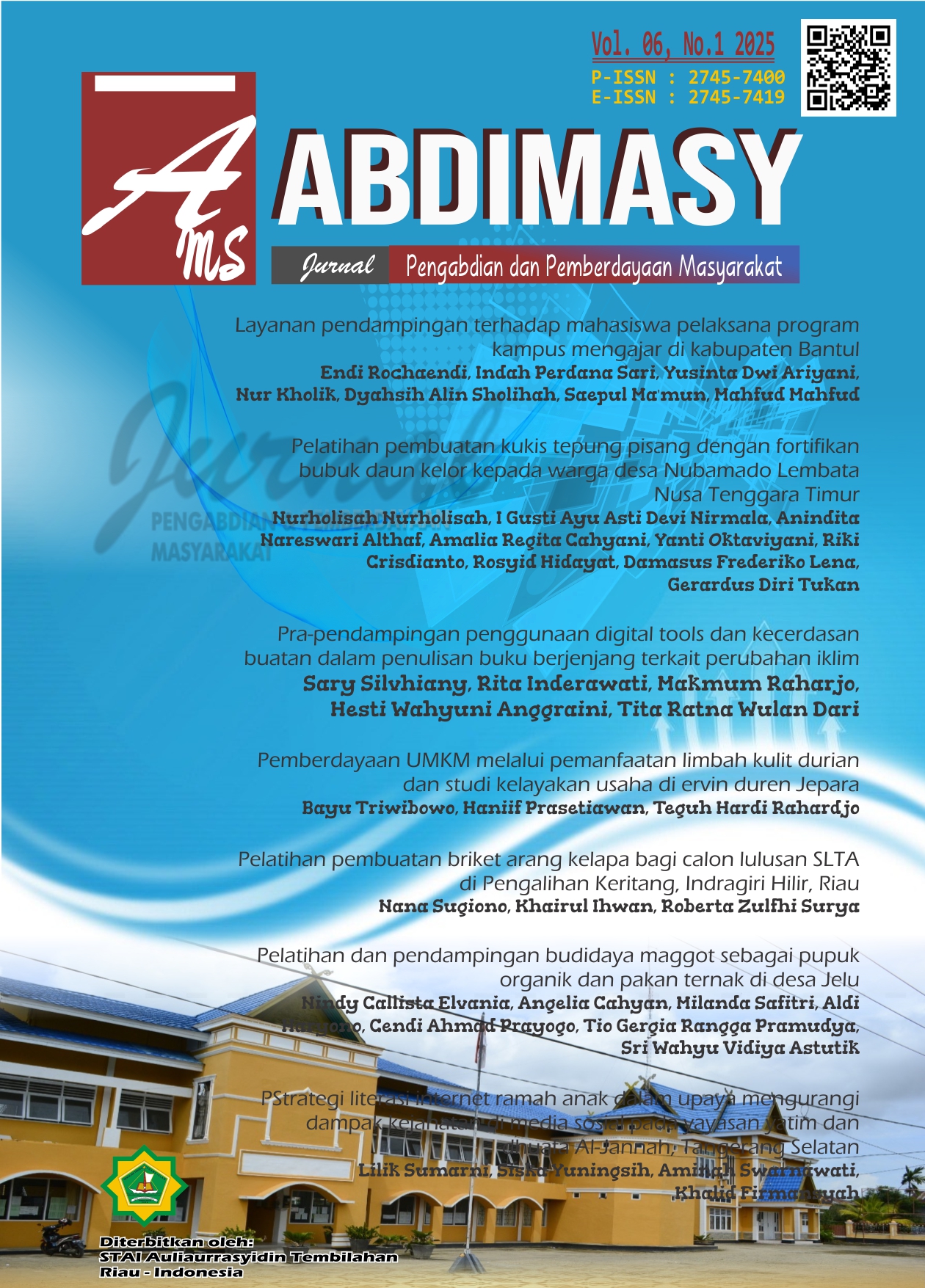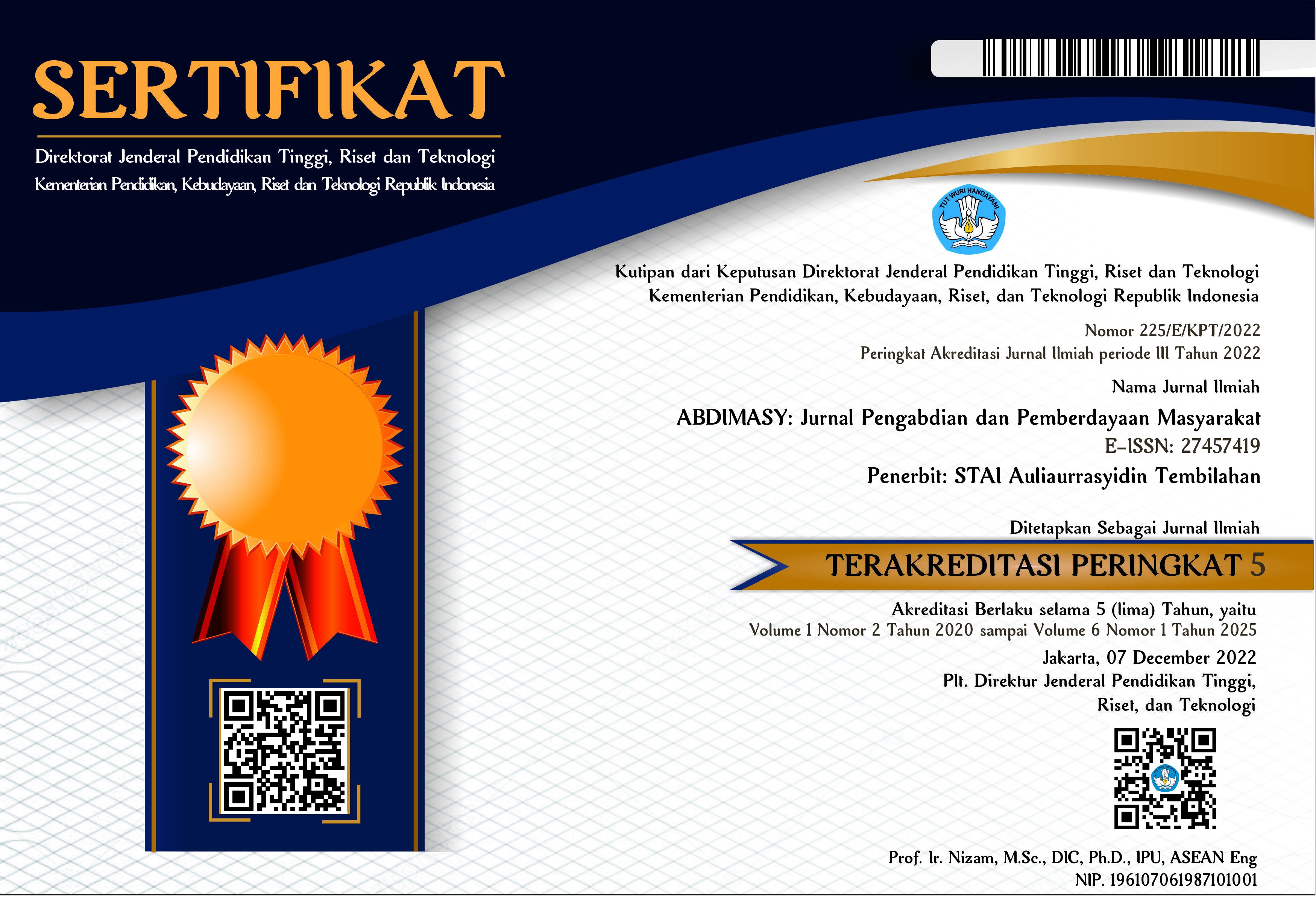Strategi literasi internet ramah anak dalam upaya mengurangi dampak kejahatan di media sosial pada yayasan yatim dan dhuafa Al-Jannah, Tangerang Selatan
DOI:
https://doi.org/10.46963/ams.v6i1.2906Keywords:
Digital Literacy, Child-Friendly Internet, CyberbullyingAbstract
The widespread use of the internet among children without adequate supervision increases their risk of exposure to harmful content, such as cyberbullying, hoaxes, pornography, and digital addiction. A similar challenge was observed at the Al-Jannah Orphan and Underprivileged Foundation in South Tangerang, which oversees 23 foster children under the care of four guardians with limited digital literacy. To address this issue, a community engagement program was implemented, incorporating counseling, role-play, and empathy-based digital parenting training. Post-intervention assessments revealed significant improvements, with a 39% average increase in children’s understanding of digital ethics and a 46% average rise in caregivers’ readiness to supervise online activities. This initiative not only impacted individuals but also fostered a transformative shift toward a more supportive digital caregiving ecosystem. The program is expected to serve as a sustainable model for digital literacy mentoring in similar care institutions, cultivating an ethical, resilient, and digitally savvy generation.
Downloads
References
Aini, F. N. (2022). Implementasi literasi digital dalam pembelajaran daring. Ibtidaiyyah: Jurnal Pendidikan Guru Madrasah Ibtidaiyah, 1(3), 242–262. https://doi.org/10.18860/ijpgmi.v1i3.2383
Ayuni, I., Winoto, Y., & Khadijah, U. L. (2022). Perilaku literasi informasi pada anak di media sosial. Literasi: Jurnal Bahasa Dan Sastra Indonesia Serta Pembelajarannya, 6(2), 176. https://doi.org/10.25157/literasi.v6i2.7728
BPS. (2022). Statistik Telekomunikasi Indonesia 2021. https://www.bps.go.id
Cucu, K., Sanusi, U., Manpa, D., & Imam, T. (2021). Peran Orang Tua dalam Pembinaan Remaja. Kalteng.Bkkbn.Go.Id, 7(1), 25–36. https://kalteng.bkkbn.go.id/?p=993
KPPPA. (2023). Laporan Survei Nasional Perlindungan Anak Di Era Digital. Kementerian pemberdayaan perempuan dan perlindungan anak. https://kemenpppa.go.id
Putra, R. D., Rosit, M., & Lathifa, E., & Fitriati, D. (2022). Peningkatan literasi internet dan penguatan sistem informasi desa bagi perangkat desa Kiarasari Kecamatan Sukajaya Kabupaten Bogor. 13(1), 27–37. CoverAge: Journal of Strategic Communication, 13(1), 26-37. https://doi.org/10.35814/coverage.v13i1.3518
Raharjo, N. P., & Winarko, B. (2021). Analisis tingkat literasi digital generasi milenial Kota Surabaya dalam menanggulangi penyebaran hoaks. Jurnal Komunika: Jurnal Komunikasi, Media Dan Informatika, 10(1), 33–43. https://doi.org/10.31504/komunika.v10i1.3795
Redhana, I. W. (2024). Literasi Digital: Pedoman Menghadapi Society 5.0. Samudra Biru.
SAFEnet. (2024). Laporan Keamanan Digital Anak dan Remaja Indonesia 2023. Southeast Asia Freedom of Expression Network. https://safenet.or.id
Sanusi, A. (2023). Sistem Nilai: Alternatif Wajah-Wajah Pendidikan. Nuansa Cendekia.
Setiani, N. N., & Barokah, N. (2021). Urgensi literasi digital dalam menyongsong siswa sekolah dasar menuju generasi emas tahun 2045. Prosiding SEMAI: Seminar Nasional PGMI, 1, 411–427. https://proceeding.uingusdur.ac.id/index.php/semai/article/view/400
Susanti, M. (2024). Penguatan literasi media digital dalam melawan penyebaran berita hoax terhadap anak dan remaja. Indonesian Journal of Multidiciplinary Expertise Indonesian Journal of Multidisciplinary Expertise, 2(2), 44–49. https://doi.org/10.31004/ijme.v2i2.37
Tiara Fany Chintia Silitonga, Wulan Purnama Sari Simatupang, Loise Chisanta Ginting, Muhammad Aimar Zaidan, & Harrys Cristian Vieri. (2023). Peran panti asuhan yayasan rumah bakti kasih anak indonesia dalam membentuk karakter anak panti. SOSMANIORA: Jurnal Ilmu Sosial Dan Humaniora, 2(1), 1–6. https://doi.org/10.55123/sosmaniora.v2i1.1461
Wibowo, H. S. (2023). Penguatan Literasi Digital: Menguasai Dunia Literasi di Era Digitalisasi. Tiram Media
Downloads
Published
Issue
Section
License
Copyright (c) 2025 Lilik Sumarni, Siska Yuningsih, Aminah Swarnawati, Khalid Firmansyah

This work is licensed under a Creative Commons Attribution-ShareAlike 4.0 International License.
Authors who publish with this journal agree to the following terms:
1. Copyright on any article is retained by the author(s).
2. The author grants the journal, right of first publication with the work simultaneously licensed under a Creative Commons Attribution shareAlike 4.0 International License that allows others to share the work with an acknowledgment of the work’s authorship and initial publication in this journal.
3. Authors are able to enter into separate, additional contractual arrangements for the non-exclusive distribution of the journal’s published version of the work (e.g., post it to an institutional repository or publish it in a book), with an acknowledgment of its initial publication in this journal.
4. Authors are permitted and encouraged to post their work online (e.g., in institutional repositories or on their website) prior to and during the submission process, as it can lead to productive exchanges, as well as earlier and greater citation of published work.
5. The article and any associated published material is distributed under the Creative Commons Attribution-ShareAlike 4.0 International License





2.png)



